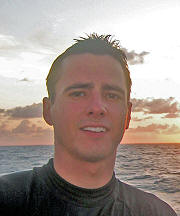![]()
![]()
 Evan
D'Alessandro
Evan
D'Alessandro
Ph.D. Student, Marine
Rosenstiel School for Marine and Atmospheric
Science
University of Miami
email:
[email protected]
Most reef fishes have a complex life cycle consisting of a larval pelagic stage that settles and undergoes metamorphosis into a reef-associated juvenile, which then grows into a terminal adult stage. Many reef fish larvae spend weeks in the pelagic environment where they are subject to a number of highly variable biological and physical processes. These processes underlie variability in the magnitude and spatial distribution of larval supply and contribute significantly to variability in recruitment and ultimately adult populations.
My research interests involve the early life stages of coral reef fishes and how physical environmental parameters interact with them to produce observed patterns of growth, delivery, settlement, and survival. In particular, I am interested in the effects that stochastic oceanographic features, such as internal tidal bores and large scale gyres, may have on the delivery of fish larvae to reefs. Determining whether such features help to retain fish as well as other larvae near their reefs of origin or serve to transport them away has important implications for population connectivity and management of these fragile ecosystems.
My current thesis work is centered on an extensive time series of near-reef ichthyoplankton samples collected off Key Largo. By comparing this data to concurrently collected oceanographic and atmospheric data the pattern of larval fish supply to this area can be described in terms of both cyclic and stochastic environmental factors. This research will help to improve the predictability of reef fish recruitment and the overall understanding of variability in reef fish populations.